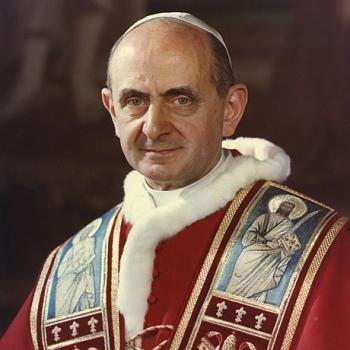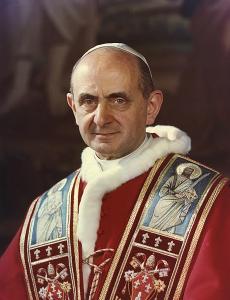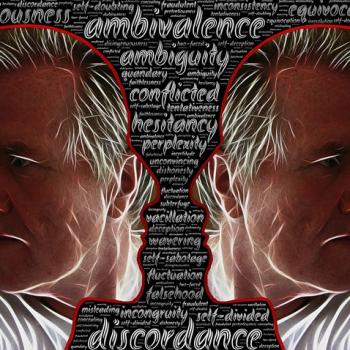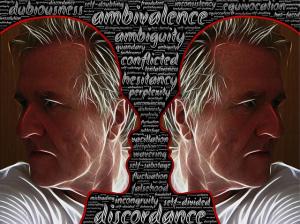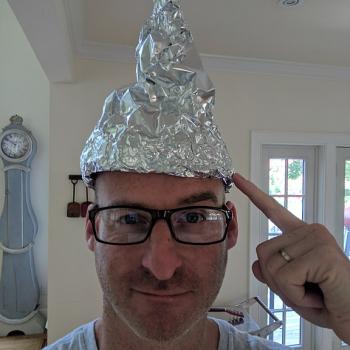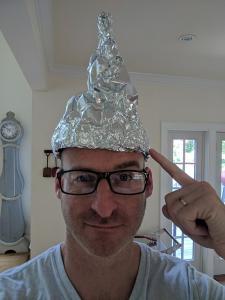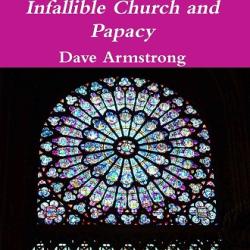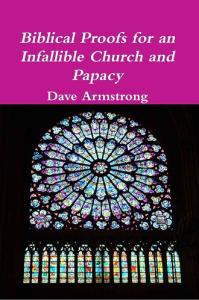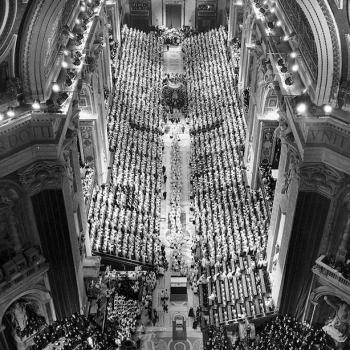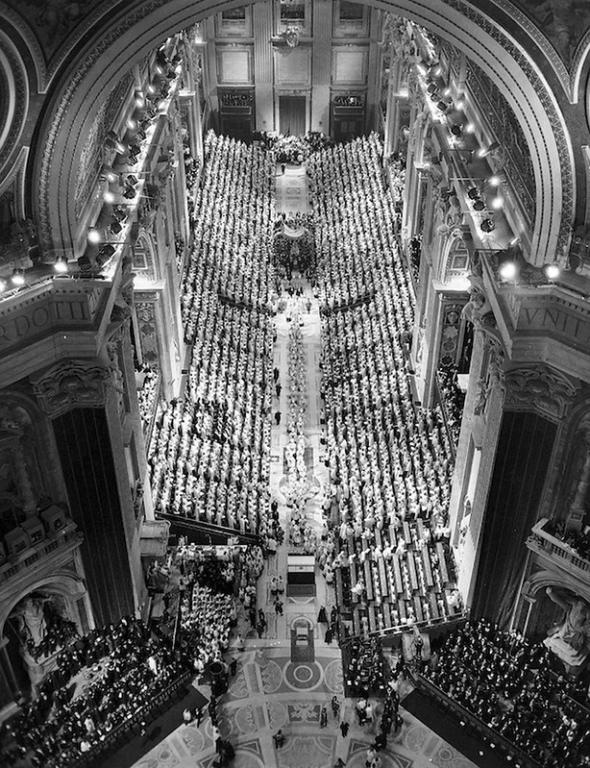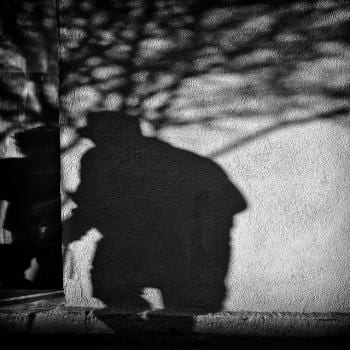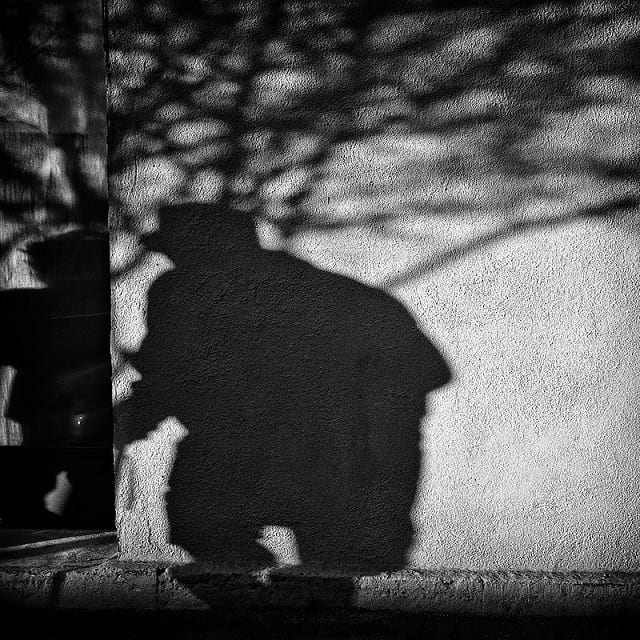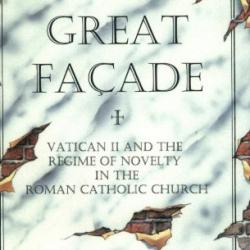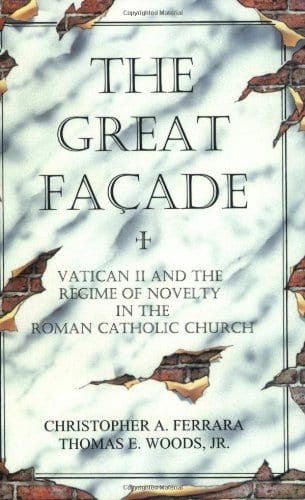Chapter 13 (pp. 113-121) of my book, Reflections on Radical Catholic Reactionaries (December 2002; revised second edition: 17 August 2013; slightly revised again in November 2023 for the purpose of the free online version). Anyone who reads this book should first read the following three introductory articles, in order to fully understand the definitions and sociological categories I am employing:
Introduction (on the book page)
Definitions: Radical Catholic Reactionaries, Mainstream “Traditionalists,” and Supposed “Neo-Catholics” [revised 8-6-13]
Radical Catholic Reactionaries: What They Are Not [9-28-21]
If you’re still confused and unclear as to my meanings and intent after that, read one or more of these articles:
Rationales for My Self-Coined Term, “Radical Catholic Reactionaries” [8-6-13]
My Coined Term, “Radical Catholic Reactionary”: Clarifications [10-5-17]
Clarifying My Coined Term, “Radical Catholic Reactionary” [4-3-20]
This book is modeled after the method and structure of the French mathematician and Catholic apologist Blaise Pascal’s classic, Pensées (“thoughts”). Catholic apologist and philosopher Peter Kreeft described this masterpiece as “raw pearls” and “more like ‘sayings’ than a book . . . ‘Sayings’ reflect and approximate the higher, the mode of Christ and Socrates and Buddha. That’s why Socrates is the greatest philosopher, according to St. Thomas (S.T. III, 42, 4).”
*****
- Radical Catholic reactionaries claim that in order to be faithful and consistent with pre-Vatican II Church teaching, it is necessary to “carefully nuance” loyalty to post-conciliar popes and Church teaching. In other words, one must play a game of equivocation and rationalizing (precisely the accusation they make regarding both “conservatives” and “modernists”). Needless to say, this alleged dramatic contradiction between the popes before 1958 and those after is entirely mythical, and contrary to the faith of an orthodox Catholic.
- Yet reactionaries apparently think little of disobeying papal injunctions that they dislike. Their difficulties thus extend a bit beyond merely Vatican II and its historical aftermath. Internal submission to (even sub-infallible) papal and conciliar teaching is certainly a pre-conciliar requirement for an obedient Catholic, but reactionaries aren’t widely observed to be suffering terrible pangs of conscience over their disobedience to that quite traditional and formerly assumed Catholic distinctive.
- How is such a bleak (and false) view not defectibility? Three straight heretic popes?!! Why even have a pope at all if such a radical departure could occur? Why be a Catholic at all, if this is what one believes? What becomes of the faith in God’s guidance of His Church? Reactionaries should immediately become Protestants, where at least they wouldn’t have to torture logic and the received understanding of the Catholic faith, in order to maintain the pretense of “obedience” when wanton disobedience is plainly manifest. A high price to pay for one’s own prejudices, limited understandings, and private judgment . . .
- Rather than simply obey the pope and council, and trust that God understands and controls things that may be beyond us, some reactionaries would rather throw out the council and disobey the pope, considering him a heretic. How is this at all distinguishable from Martin Luther’s defiant stance at the Diet of Worms in 1521? In fact, it is worse, as papal and conciliar infallibility are both far more defined now than in his day.
- Venerable Pope Pius XII, in his encyclical, Humani Generis (12 August 1950), wrote about the authority of papal encyclicals (which reactionaries seem to have forgotten when it comes to Pope St. John Paul II):
Nor must it be thought that what is expounded in Encyclical Letters does not of itself demand consent, since in writing such Letters the Popes do not exercise the supreme power of their Teaching Authority. For these matters are taught with the ordinary teaching authority, of which it is true to say: “He who heareth you, heareth me”;[3] and generally what is expounded and inculcated in Encyclical Letters already for other reasons appertains to Catholic doctrine. But if the Supreme Pontiffs in their official documents purposely pass judgment on a matter up to that time under dispute, it is obvious that that matter, according to the mind and will of the same Pontiffs, cannot be any longer considered a question open to discussion among theologians. (20)
Note that submission is not confined to ex cathedra statements — the authoritative “world” which reactionaries seem to wish to reside in almost exclusively. Ven. Pope Pius XII then touches upon development of doctrine and Church authority. This has relevance to the current dispute over Vatican II and supposedly “novel” doctrines:
. . . together with the sources of positive theology God has given to His Church a living Teaching Authority to elucidate and explain what is contained in the deposit of faith only obscurely and implicitly. This deposit of faith our Divine Redeemer has given for authentic interpretation not to each of the faithful, not even to theologians, but only to the Teaching Authority of the Church . . . (21)
In other words, the pope urges us to let the magisterium determine such weighty matters, not “each of the faithful,” as in reactionaryism and sola Scriptura Protestantism.
- Reactionaries often falsely accuse so-called “conservative Catholics” of denying the fact that a pope can be rebuked. This is certainly untrue in my case, as I have written elsewhere:
Pope John XXII was soundly and successfully rebuked by the masses when he temporarily espoused belief in a false doctrine. St. Catherine of Siena, St. Bernard of Clairvaux, and St. Francis of Assisi rebuked popes, and their advice was respected and heeded (St. Francis wasn’t ordained). These saints were the most revered Catholics of their time (one might think of Mother Teresa in our time). I’m sure there were also many instances of morally inferior popes (many during the Renaissance) being soundly rebuked by holy priests and laymen. This is nothing novel whatsoever in Catholic ecclesiology. No one knows better than Catholics the distinction between the nobility of an office and (too often) the sanctity of the person holding it at any given time. Of course, this has always been the case in the Church and amongst the Old Testament Jews (one need only recall Moses, David, Judas, and St. Peter himself).
- Sure, laymen can petition the pope and so forth, but reactionary aspirations are based on the false assumption and presumption that an ecumenical council could fail in its purpose in the first place. As that is not Catholic teaching, it is hardly a conceivable scenario. It is the pope’s job to correct councils, not ours. We possess no such authority. Pope St. Paul VI changed some things, and then ratified the council. Rome has spoken; case closed.
- The possibility of theoretical corrections of popes is not at issue. The real issue is when and how to do so (and the frequency of such momentous occasions), and whether the present situation is such an occasion, and, on the flip side, the routine obligation of Catholics to obey the pope and his decrees (and councils), whether infallible or ex cathedra or not — which spirit reactionaries show precious little indication of possessing.
- “Conservative” Catholics – so it is alleged — think popes and ecumenical councils are verbally inspired, and therefore above criticism. This is ludicrous. Only the Bible is verbally inspired, of course. Reactionaries often stoop to gross caricature of the orthodox Catholic viewpoint (which they call “conservative”). The obligation of the Catholic is to give religious submission of mind and will and interior assent to popes and ecumenical councils — even when sub-infallible, or infallible in the ordinary magisterium (as opposed to extraordinary or ex cathedra). This point is frequently ignored by reactionaries. Instead, they merely repeat the caricature of our true beliefs about Catholic authority, because it serves as a convenient polemical “club.”
- If Pope St. Paul VI was so weak and compromised with modernism, how, then, could he write the magnificent and heroic Humanae Vitae, against the majority advice of his own advisors, in direct defiance of the liberals? Nothing was ever so unfashionable as opposition to unrestrained sexual freedom, at that time. This heroic pope suffered “white martyrdom” if anyone ever did. And I happen to have personally known one of his close advisors (Servant of God Fr. John A. Hardon, S. J.), so I have a little bit of inside information about that, beyond mere outward speculation.
- Chapter III of the document on the papacy from Vatican I: On the Power and Nature of the Primacy of the Roman Pontiff, just prior to the next chapter’s proclamations on infallibility itself, refers to a:
. . . sovereignty of ordinary power . . . to which all, of whatsoever rite and dignity, both pastors and faithful, both individually and collectively, are bound, by their duty of hierarchical subordination and true obedience, to submit, not only in matters which belong to faith and morals, but also in those that appertain to the discipline and government of the Church throughout the world; so that the Church of Christ may be one flock under one supreme pastor, through the preservation of unity, both of communion and of profession of the same faith, with the Roman pontiff. This is the teaching of Catholic truth, from which no one can deviate without the loss of faith and of salvation.
Reactionaries are, therefore, fundamentally disobedient in their cavalier dismissal of the pope’s teachings — even when considered as technically on a sub-infallible level.
- The faithful Catholic accepts all that a council or pope of his Church teaches, short of the most outrageous and glaringly obvious error (for example, the error of Pope St. John XXII about the Beatific Vision, which he changed when near death).
- I think reactionaryism has a strong attitudinal element or tendency, akin to that found in other points of view, such as anti-Catholic Protestantism or “Catholic” theological liberalism. One can see no good in the pope, or no bad, or one can take a middle position (which I would call orthodoxy and being a faithful, obedient Catholic), where the pope’s words and actions are accorded the immense respect and reverence appropriate to his exalted office, but where aspects of prudence or particular errors might be pointed out. It seems that the reactionaries want to make out like those of us who disagree with them are ultramontanists who think the choice of socks the pope wears every day is an ex cathedra doctrine. It is not normative or appropriate for a Catholic to go on and on, railing against the pope. It’s usually bad form and highly presumptuous. There have been “bad popes,” of course, but recent ones are not among them.
- Yes, one can conceivably question the pope — especially his actions, yet it must be done only with overwhelming evidence that he is doing something completely contrary to Catholic doctrine and prior practice. It is not something that a non-theologian or non-priest should do nonchalantly and as a matter of course. To do so would smack far too much of the Protestant attitude of private judgment and lack of an authority structure.
- Any moderately informed Protestant knows that a Catholic ought to be obedient to the pope in all but the most extraordinary circumstances. That’s surely how I would have perceived the orthodox Catholic position, when I was still Protestant. I would have immediately determined that reactionaries were liberals or radically inconsistent Catholics.
- There is a world of difference between a St. Catherine of Siena or a St. Francis of Assisi rebuking a pope (or, say, Cardinal Ratzinger or St. Teresa of Calcutta, privately), and zealous, still wet behind the ears apologists and loudmouthed reactionary laymen doing so. One either immediately grasps this self-evident point or they do not. But it’s clear that — failing to grasp it — rational argument from within a Catholic framework is pretty much futile.
- It’s normal and ethical (and quite Catholic) to indignantly respond to the petulant, pompous, and presumptuous tone of so many reactionary statements about recent popes. If they can speak so cavalierly and arrogantly about popes (I had far more respect for popes as a Protestant than they do), then surely we can wax indignant at them doing so, without being “rude.” One is not awakened by a soft voice.
- Pope St. Leo the Great and Pope St. Gregory the Great reigned at a time when the Monophysite heresy was flourishing. Does that make them lousy popes too? When is there ever not heresy? Reactionaries retort that Pope St. Paul VI’s reign coincided with the beginning of modernism, or liberalism. That would hardly do, since modernism was written about in 1864, 1907, etc. Modernism essentially began with the so-called “Enlightenment,” if not the Protestant Revolution (actually, the Fall of Man, in a large sense).
- It would be beyond silly to cast the lion’s share of the blame for modernism on Pope St. Paul VI. The 1960s were merely the fruition of a long 200+ years trend, primarily due to the rapid breakdown of the larger culture. Pope Paul VI wouldn’t have been able to stop it any more than a twig could stop the water from a burst dam. Doctrinal chaos and upheaval to some extent always happens after ecumenical councils, anyway (as with, e.g., Nicaea and Arianism).
- Many orthodox Catholic observers think Pope St. Paul VI could have been more vigilant against the liberals. But that is a far cry from being one of the worst popes ever, as some reactionaries seem to think he was. The worst popes ever were whoring and living it up, not writing heroic encyclicals in direct confrontation with the overwhelming forces of secular culture. Even reactionaries admit that Humanae Vitae was great.
- Many reactionaries make their excoriating judgments of popes as if they had no more importance or gravity than reeling off a laundry or grocery list. Who are they to presume what they do? What are their exalted credentials, whereby they feel so free to sit and condemn entire papacies with one-sentence salvoes?
- Even if reactionaries are right about some particulars in their incessant criticisms of recent popes, they ought to express their opinion with the utmost respect and with fear and trembling, grieved that they are “compelled” to severely reprimand the Vicar of Christ. St. Paul showed more deference even towards the Jewish high priest than such people do to popes (Acts 23:1-5). After saying to Ananias “God will strike you, you whitewashed wall,” he stated in v. 5: “I did not know, brethren, that he was the high priest; for it is written, ‘You shall not speak evil of a ruler of your people.'” Even immediately before His scathing rebuke of the Pharisees, Jesus told His followers to “practice and observe whatever they tell you” (Matthew 23:3). Why? Because the “The scribes and the Pharisees sit on Moses’ seat . . .” (23:2). The pope occupies the Chair of Peter, established by our Lord Jesus Himself, and is the Supreme Head of the Church. Pope-bashing reactionaries must be willing to “practice and observe whatever they tell you” (including disciplinary proclamations, liturgical details, etc.). In any event, the popes certainly have as much authority as non-Christian scribes and Pharisees. We see both St. Paul and our Lord Jesus expressing the most vehement criticisms of appointed religious leaders, yet Paul showed quite considerable deference when he found out the office of the one he was criticizing, and Jesus commanded obedience to the very same people whose hypocrisy He excoriated. This is all consistent with the traditional, orthodox Catholic (and what is called by reactionaries the “neo-Catholic” or “conservative”) view.
- Second Vatican Council (Lumen Gentium, 25):
In matters of faith and morals . . . religious submission of will and mind must be shown in a special way to the authentic teaching authority of the Roman Pontiff, even when he is not speaking “ex cathedra.” That is, it must be shown in such a way that his supreme magisterium is acknowledged with reverence, the judgments made by him sincerely adhered to, according to his manifest mind and will. His mind and will in the matter may be known chiefly either from the character of the documents, from his frequent repetition of the same doctrine, or from his manner of speaking.
- To submit an analogy: I, as a parent, can tell my son to not fornicate. That would be, in effect, an infallible statement, in terms of moral certainty. I could also forbid him to stay out till after, say, 11:00 PM. Obviously, the second is a much less certain proposition, in terms of right and wrong. But my son is bound to obey both “commands,” by the natural order of the authority of parents. Thus, I have exercised two very different levels of “infallibility,” yet both entail more or less absolute obedience, by the order of things — the way God set up the family and “chain of command.” That’s why this desire to have so many loopholes in conciliar and papal authority is a fundamentally liberal and dissenting outlook.
- We might ponder other examples of authority, such as the military. Does a private cavalierly disobey the orders of a captain, let alone a general? Of course he does not. Does a lowly trial lawyer disregard the orders of a judge, let alone the rulings of the Supreme Court of his state or the nation? No; or if he does, there is a penalty to pay. Even in a family, there is a clear God-ordained authority. Children obey their parents. They instinctively know this. Down deep, they want to do this (and they know that they need to). Just as the father is the head of the household, so the Holy Father is the head of the Church. This is all self-evident. People understand the basic concept of authority. Yet when it comes to the Catholic Church, which has always believed in a supreme teacher, the vicar of Christ, the head of the Church, upon whom rests the final appeal in Church matters in every sense, we have the curious and astonishing novelty of mere laymen (reactionaries) routinely questioning papal authority and running it down at every opportunity.
*
*****
*
Summary: Chapter 13 of my book, Reflections on Radical Catholic Reactionaries (December 2002; revised in November 2023 for the purpose of the free online version).


